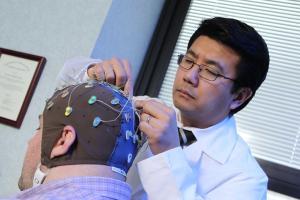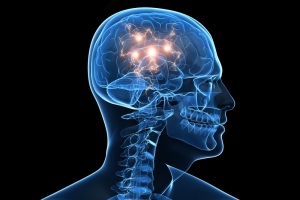Does Brain Damage Prove that Consciousness is Physical? Can Nonphysical Things Exist? #28
The following is an atheist objection to this recent post I made on social media:
"Just finished my chapter on consciousness for my book, 'Why I'm Not an Atheist'. In a nut shell the chapter can be summed up as follows:
If atheism is true, then physicalism is true (elaborated on in the book). According to physicalism, human beings are merely physical machines with physical parts and physical functions. Nothing non-physical is allowed. Therefore, if atheism is true, then consciousness, if it exists, must be something physical (like the brain).
However, my thoughts can have the property of being true or false, but no region of my brain can be true or false. The statement itself is incoherent. Therefore, since there are things true of my thoughts that are not true of my brain, the two cannot be the same thing. And if the two cannot be the same thing, then evidently, consciousness cannot be physical.
Here was the objection:
How to refute Christianity:
P1: If Christianity is true, then its »primacy of consciousness« is true.
P2: If the »primacy of consciousness« is true, then no damage to the brain can ever affect the consciousness by definition as neither matter nor natural forces and laws could ever account for the consciousness but instead, the consciousness would be imposed upon matter via divine intervention.
P3: Brain damages can affect the consciousness (e.g. certain brain diseases can make it possible that you no longer can recognize yourself in a mirror; we are even 
C1: The »primacy of consciousness« is false
C2: Xianity is false.
The consciousness is an emergent property of specific matter. Therefore, you committed the fallacy of composition when you said "my thoughts can have the property of being true or false, but no region of my brain can be true or false".
Consciousness is a description of what our brain allows us to do/to be. You cannot really choose to be conscious.
If Christianity were true, we even could be literal straw men or have straw inside our skulls instead of the grey mass we call 'brain' and yet, be as we are with that grey mass. If our brain with its structure has absolutely nothing to do with how we are, 
"Nothing non-physical is allowed"
Wrong. Non-physical things have yet be demonstrated to exist.
If both the physical (e.g. dust grain) and non-physical (e.g. God) exist, then they necessarily must have something in common that puts them in the same category (here: existence). What is it? Otherwise, I want to you to provide another definition for 'existence' regarding the non-physical. You can't even tell the difference between the non-physical and the non-existent.
Conclusion: Your rejection of atheism entirely rests upon a blatant ignorance of reality and how it works.
- El Bastiano, (Atheist from Germany)
My response:
That was a valiant effort but, unfortunately, is the typical “objection” for this argument and I in fact cover both objections in the book (the alleged fallacy of composition and confusing identity). So it’s quite comforting to know that this is still the best “objection” that the atheist has and one can’t help but wonder if all internet atheists get their responses from the same atheist website.
Lets start with the assertions in your premise 2.
- “..consciousness would be imposed upon matter via divine intervention”.
I have no idea where you got that from and this is to confuse a primary cause with a secondary cause. For e
- “..no damage to the brain can ever affect consciousness by definition”.
Again, no. So far, in your first objecting statement, both of your claims are false. To my knowledge, there is no reputable, Christian academic scholar who would ever make or defend either one of these claims that you have made. You are getting false information from somewhere or have not actually looked into these issues for yourself.
Moreover, to argue that just because one thing has a cause and effect relation to another thing does NOT mean that they are identical. For example, playing the note 
- “Consciousness is an emergent property of specific matter. Therefore, you committed the fallacy of composition”
This is strike 3 with false claims. I cover the emergence of consciousness from matter in this article here, but suffice it to say that this is now attributing the existence of immaterial entities into your atheistic framework and arguing for property dualism (that the mind is both physical AND immaterial), which is essentially my position. So that is just a naughty slide of hand on your part. And while I cover the fallacy of composition in that article as well, I can briefly lay out why this is not such a fallacy.
The fallacy of composition would be like saying this- “A single brick weighs one pound, ther
- “Non-physical things have yet be demonstrated to exist…I want to you to provide another definition for 'existence' regarding the non-physical. You can't even tell the difference between the non-physical and the non-existent.”
Now that's strike four. Or perhaps foul ball? Again, this is a misunderstanding of the nature of existence. I’ll give you a very simple definition of existence. Something 
So, colors are not physical, but surely they exist. In fact, I’ll even go as far as to say colors do NOT depend on light waves for their existence. Allow me to kill two birds 
- “Your rejection of atheism entirely rests upon a blatant ignorance of reality and how it works.”
Actually, no. And since I have refuted every claim that you’ve made by showing them to be false or misguided, my argument still stands. Consciousness is not physical and atheism is false. So if anything, it would seem that your acceptance of atheism rests entirely upon a blatant gullibility to believe anything you read on an atheist website.
-Eric Hernandez
Got a question? Submit any questions regarding God, Philosophy, Apologetics, Theology, Christianity, or the like to our ministry via Facebook, Youtube or our Website. Thank you and God bless.
Related Articles:








What do you mean by wetness? Wetness doesn’t come about simply by virtue of their being a water molecule. There needs to be a water molecule that is adjacent to some other thing. So it is this arrangement that is necessary for ‘wetness’ to emerge.
Also let’s look at something like traffic. Traffic is often called an emergent property of cars and the road system and all that. This requires the matter (the cars), to be in a particular arrangement (bumper to bumper) AND moving in some direction (otherwise you have a parking lot). Sometimes you need a behaviour or an act for the matter to create some emergent property.
So what do you mean by consciousness? If someone suffers from a traumatic brain injury and they aren’t able to think or act the same way, doesn’t that show that consciousness is emerging from the physical aspects of the brain? Not just the matter that makes up the brain, but the arrangement of that matter and the way that matter behaves or acts.
Otherwise you are saying that consciousness independent of the brain, but it is inextricably linked to the brain. This seems contradictory.
Wetness is a property. Are you familiar with what a property is? And more specifically, a structural property of hydrogen and oxygen. So yes, it is an arrangement. I don’t follow what you are getting at in your first paragraph?
You are describing a physical function in the second paragraph, but again, don’t see the relevance or what point you are trying to make? Perhaps I am missing something. Please feel free to clarify your contention (if any).
By consciousness I mean a mental state or event. There are 5 states of consciousness: thoughts, beliefs, sensations, desires, and acts of will. Any of those five constitute consciousness.
So far I have not made a stance on the relation of the brain and mind/consciousness in this article. My only point is that they are NOT the same thing. One is physical and the other is immaterial. Dependence is a separate issue that I have not addressed here, neither did I intend to. The key point here is (as I stated) that identity is not the same thing as a causal, dependent relationship. (See guitar analogy).
What exactly about this article in particular do you disagree with or would like me to elaborate on?
I think the argument about consciousness being an emergent property is the same as my examples of ‘wetness’ or ‘traffic’. They require certain matter to be arranged a certain way and acting in a certain way.
This is distinctly different than your guitar example. The guitar string is not sound, you are correct there. But the air molecules being arranged as they are and acting in a particular way (vibrating at a certain frequency) lead to sound.
It’s not just that air molecules IS sound, or that brain matter IS consciousness. But that sound is an Emergent property of air molecules acting a particular way and brain matter acting in a particular way.
This isn’t so much a question, just an explanation of the idea behind emergence.